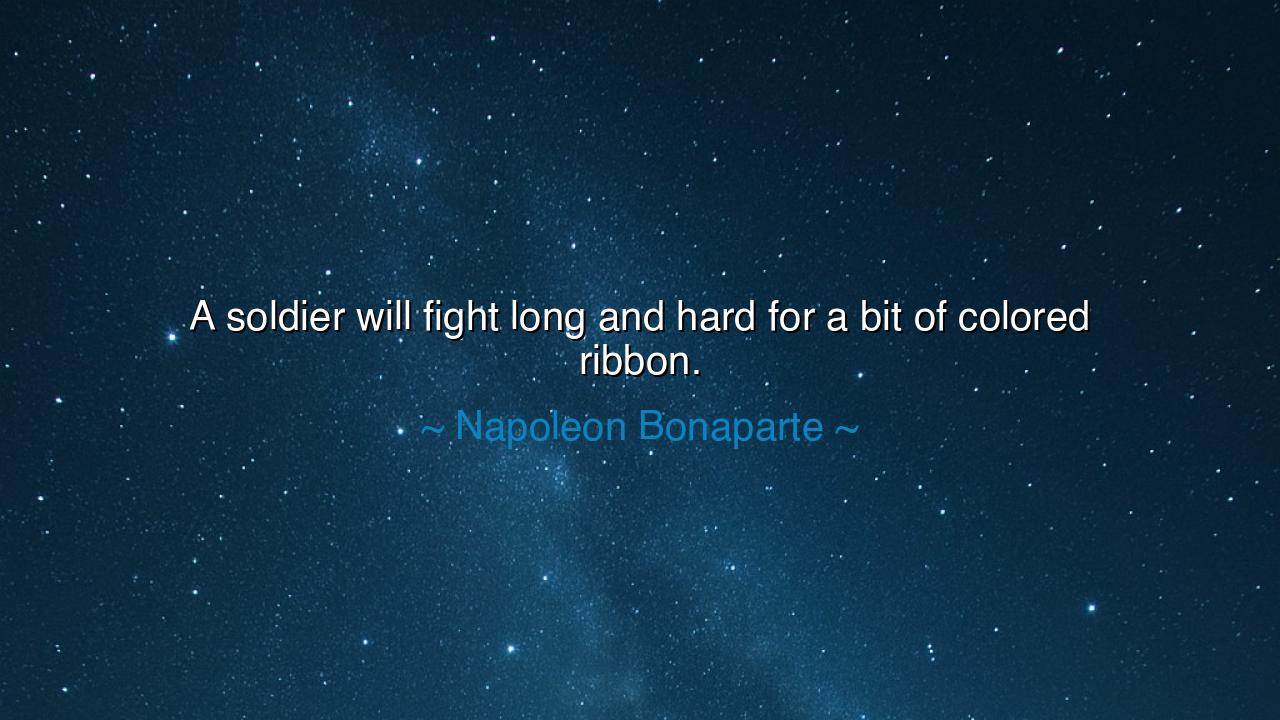
A soldier will fight long and hard for a bit of colored ribbon.






Napoleon Bonaparte, master of war and architect of empires, once spoke with startling clarity about the heart of men in battle: “A soldier will fight long and hard for a bit of colored ribbon.” In these words lies not mockery, but revelation. Napoleon, who commanded the devotion of countless men, understood that beyond pay and rations, beyond duty and discipline, there burns in the human spirit a hunger for honor, for recognition, for the small yet sacred tokens that say: “Your sacrifice is remembered.” That colored ribbon, simple in material yet mighty in meaning, carried the weight of glory, belonging, and immortality.
The origin of this insight rests in Napoleon’s creation of the Légion d’honneur, the Legion of Honor, in 1802. He knew that soldiers, weary from years of campaigns, were not driven only by coin or command. What stirred their hearts was the hope of distinction, the visible sign that their courage and endurance would not fade into anonymity. Thus he gave them medals, ribbons, decorations—not of great material worth, but of immeasurable symbolic power. For with each ribbon, a soldier bore proof that his blood and sweat had meaning, that his deeds had etched his name into the living memory of the nation.
History confirms Napoleon’s wisdom in every age. In the trenches of the First World War, men endured mud, terror, and the thunder of unending shells. For many, what sustained them was not pay or promise of rest, but the hope that they might return home adorned with a medal upon their chest. That medal, perhaps only a strip of colored ribbon, transformed suffering into honor, and turned private anguish into public recognition. The ribbon told the world: “I gave myself for you.” Such tokens became the bridge between individual sacrifice and collective remembrance.
Yet Napoleon’s words carry also a deeper, more universal truth: men and women are not sustained by bread alone, but by meaning. The colored ribbon is but a symbol of that greater hunger—the longing to know that one’s labor, one’s endurance, one’s pain has value. We are all soldiers in our own battles, and in each heart lies the desire for recognition, whether through honor, gratitude, or remembrance. Napoleon’s genius was not merely to lead armies, but to understand the invisible force that moves the human soul.
At the same time, there is a danger hidden in this truth. For rulers may exploit it, offering empty ribbons in exchange for endless toil and sacrifice. A strip of cloth can inspire courage, but it can also blind men to the cost of their suffering. Thus Napoleon’s words are double-edged: they reveal the nobility of men who fight for honor, but also the power of leaders who know how to bend that nobility to their own designs. The ribbon is glorious, but it can also be a chain.
The lesson for us is to understand both the strength and the vulnerability of the human spirit. We must give honor where honor is due, remembering that recognition can sustain the weary and dignify the fallen. But we must also beware of false honors, of hollow rewards that exploit loyalty without justice. To be true patriots, true leaders, and true citizens, we must ensure that the symbols we bestow are backed by truth, that our colored ribbons are not lies but living acknowledgments of genuine sacrifice.
Therefore, let us pass this teaching on: never underestimate the power of honor, and never despise the tokens that carry it. For though they may seem small, they bind generations together, linking the sacrifice of the few to the gratitude of the many. But let us also guard against corruption, remembering that honor must be real, lest the ribbon become mockery rather than memory. In this balance lies the wisdom of Napoleon’s words, spoken as both revelation and warning.
So let his saying endure: “A soldier will fight long and hard for a bit of colored ribbon.” For in that ribbon lives the eternal truth of the human heart—that beyond wealth and power, what we seek most deeply is meaning, remembrance, and honor that outlives our mortal days.






AAdministratorAdministrator
Welcome, honored guests. Please leave a comment, we will respond soon